Mentoring Towards Malice
Is Academic Freedom A Defamation Defence? Galloway v. A.B. May Decide
Although there is a dedicated group who have consistently said otherwise, the intent behind the UBC Accountable Open Letter was always to restore balance to the disgraceful way UBC handled the sexual assault allegations against novelist and UBC Creative Writing Chair Steven Galloway, including how UBC exploited students to burnish its tarnished reputation, thereby pushing them into the crossfire of what the media would dub “a Literary Civil War.”
I didn’t write the UBC Accountable Open Letter, but I did publish it. I edited an early draft which made no reference to the harm caused to the complainants. Shortly before it was published, I emailed the authors working on it to suggest that we make it stronger in empathizing with the complainants’ rights and stating that we were seeking “empathy for all parties.” I also suggested the inclusion of the following sentence:
UBC had the opportunity to set the highest example but instead has lowered the bar, created major divisions in the writing community, exposing complainants and the accused to cruel and unusual punishment through the hyperbole UBC fueled on Social Media.
My comments were unanimously endorsed and sent with the latest draft to a lawyer who would look at everything and find “wording that will make the point but be safe from attack.” By that, I took it to mean a pared down version reduced to its simplest form and with the least risk in upsetting a $3 Billion a year institution that was currently enmeshed in one of the largest scandals in its history. The final version of the letter does indeed mention complainants’ rights, but admittedly in a less forceful way than I suggested.
Perhaps this was a missed opportunity on my part. More likely the additional language would not have done much good at slowing the public wars that were ahead, as those involved in the scandal were fundamentally opposed to the inquiry we were calling for. In essence, they did not want to hear anyone disagree with the notion that an accusation led immediately to guilt. And despite the specific conflict at hand, writers and academics had been on a collision course with chaos from the moment social media crept into their lives.
I’ve built two websites in the name of literary activism. The first was the website for CWILA (Canadian Women in The Literary Arts), which I built in my kitchen pulling an all-nighter. I also drafted much of the website text and then co-funded it, wrote for it and helped advise the organization until it could be handed off to a board. Probably my most important contribution to CWILA was suggesting that they not create another literary prize, as was planned, and instead create a “critic-in-residence” position to actually generate quality criticism rather than just rewarding what was already in existence.
The UBC Accountable website was created in a similar all-nighter,this time with my five-month-old son strapped to my chest. I worked through the night and finished coding the website in my car with the baby asleep behind me in his car seat.
I sat there in the car with my finger hovering above the button on my laptop. took a deep breath, and clicked “publish”. Then I posted the first UBC Accountable tweet at 5:46 am. on November 15, 2016, one year after the scandal broke. I took my son to his crib, climbed into bed and at 6:29 am I tweeted the letter again, this time tagging UBC President Santa Ono.
Exactly 30 minutes later at 6:59 am the most unexpected thing happened. President Ono direct messaged me to say he would see what could be done and that he hoped “people realize all of this happened long before I arrived at UBC.”
This was a huge development. The President of UBC was acknowledging how badly the case was handled and was expressing a desire to fix it. I responded in kind:
I can't imagine this being a fair thing to inherit at all. Part of the great tragedy is that it has hurt Steven, his family, the complainants, the Creative Writing Department, the writing community, the faculty and the students.
I will help in any way I can as I know so many in the literary community will. For all involved.
What’s really interesting is that the UBC Accountable letter, which would go on to be the focal point of the biggest division in the history of Canadian literature, nearly accomplished its goal within the first hour it was published. Sadly for everyone, things would instead get worse. Santa Ono did not take action and instead stood by while the literary community tore itself apart.
The first critic out of the gate was Dorothy Ellen Palmer, a retired schoolteacher and disability activist whose most notorious activism up to that point was leading a boycott against the Terry Fox biopic Marathon of Hope: The Musical at the Drayton Theatre in Ontario. Palmer targeted the production because the theatre had cast an able-bodied man in the roll of an amputee.
Drayton had however engaged in an international search to find an amputee to play the part but after an unsuccessful search process the casting panel (which included the choreographer who is a double amputee) looked back to Canada and eventually cast the talented Nathan Carroll, who had the unique combination of musical talent and acting chops that would allow him to carry a show in which he didn’t leave the stage for over two hours.
Online Palmer attacked anyone who mentioned MOHTM on Twitter and began harassing the staff, cast, media, production team and potential audience members who expressed interest in the show. After someone tweeted that they found Terry Fox’s story inspirational, Palmer took to Twitter to call her out for romanticizing PWDs and accusing her of engaging in “Inspiration porn.” When the staff collectively raised $3000 for cancer research by doing the Terry Fox run, Palmer attacked them online.
The Drayton Theatre provided me with an electronic folder called “Marathon of Hope Online Harassment” containing all the instances of online harassment. To Dorothy Palmer Canadians, including Terry’s brother Daryl Fox who supported the show, do not have the right to find Terry Fox inspirational and she attacked anyone who dared support the show.
“There was a militant belief that I must quit,” Carroll told me in an interview, “I was being tweeted at every day to drop out of this part but the show was successful and I earned a right to continue. It’s a specific skill set to originate a new role in a Canadian musical. It’s a skillset I spent a lot of time and money honing. I’m classically trained, went to acting school and I’ve been a musician my whole life. The show was successful and I earned a right to continue.”
Carroll who suffers from anxiety found it hard to look away. “I care about the marginalized” Carroll said, “and now I was being pushed onto the opposite spectrum. On the first day I was compared to Donald Trump.” He contacted Palmer and they met in person.
“A few times in the conversation she said ‘you seem like a really nice person’ and then she said ‘I feel like you are someone who unbeknownst to you got caught in the crossfire but unfortunately your career is going to suffer for it.’”
Palmer continued to demand that Carroll resign and went as far to say on Twitter that his casting as Terry Fox was the same thing as blackface.
Carroll shut down his Twitter account and the theatre hired extra security in case he was confronted during a performance. Palmer picketed the theatre but never confronted Carroll on stage.
“It’s interesting to feel as though someone is telling you that you are worthless.” Carroll told me. “Anxiety comes from core beliefs that you are bad or not worthy. Or not worthy of love or of respect. I’ve experienced acts of discrimination as a gay man. I’ve felt the wraith of the extreme right. I was once fired from a job for being gay. But what was really jarring was that all of a sudden I was on the other side being called the anti-progressive bigot for accepting the role to play Terry Fox.”
Carroll said that there was nothing he could do to stop the attacks and that even trying to engage in dialogue just lead to more vitriol directed at him. He said he felt like he had to “do it right and say it right immediately or else.”
In criticizing the UBC Accountable letter, Palmer positioned herself as the former branch president of the Ontario Secondary School Teachers' Federation and a union activist with expertise that gave her an insider’s knowledge of Galloway’s arbitration process, which was still in process. Palmer was scathing towards Galloway and those that signed the letter supporting his procedural (and human) rights. Above all she perpetuated the notion that Galloway was in fact guilty of sexual assault. As she wrote in her Facebook post:
They imply that Mr. Galloway is innocent. That we should value him over his accusers. That he’s "the real victim." That he should be exonerated…At best they remind me of the heartbroken Whoopi Goldberg defending Bill Cosby.”
Palmer’s post went viral, leading her to be quoted in media across the country. She also received lavish praise from people in the literary community, with Toronto Literary agent Denise Bukowski summing it up by writing on Palmer’s Facebook page: “The best thing about the Galloway affair is you.”
Then, on November 20, 2016, University of Alberta English and Film Studies professor Dr. Julie Rak published a “counter letter” condemning the UBC Accountable letter’s defence of Galloway’s right to due process. She likewise inferred Galloway’s guilt.
“To us, it is outrageous that women in Canada come forward and seek justice for being sexually harassed, raped and bullied at school, work or on the street, and then they are treated as if they were the perpetrators.”
Three days after it was posted, the letter had garnered a mere 360 signatures on change.org (most petitions don’t become newsworthy unless they hit hundreds of thousands of signatures) but due to the fact that Margaret Atwood was one of the writers being criticized, The Guardian published excerpts of her counter letter.
“We are shocked and appalled by the letter signed by many prominent Canadian writers defending Steven Galloway,” Dr. Rak wrote, “We are angered by this letter of ‘support’, because no support was expressed for the female complainant or for the other female students who felt it was safe to make complaints.”
A retired high school teacher who pickets musicals curated by a double amputee and an unheard of academic from Edmonton were now leading the charge to order the deletion of the UBC Accountable letter and demand apologies from the writers who signed it. The same day that Dr. Rak was quoted in The Guardian I published a statement to the UBC Accountable website making our intentions more clear.
“The Open Letter we signed is not about guilt or innocence and it is certainly not about restoring Galloway to any position of patriarchal power. The letter is about ensuring that someone who has been deemed Persona Non Grata can at the very least hold on to his basic right to due process so that he may navigate the complaint process with a basic amount of dignity and justice.”
But Palmer and Rak were riding a high and as far as “academic Twitter” was concerned, they were now more credible than all 90+ writers who signed the letter.
Later that week Dr. Rak tweeted out a call for academics to join an anti-Galloway panel at the ACQL academic conference.
does anyone want to be in a Galloway round table at acql with Lorraine York and me? Msg me. Let's blow it up
The panel was quickly put into place and in no time Dr. Rak had uploaded it to her online resume. She would present a paper titled, “Star-Struck, Counter-strike.” Palmer and Rak continued to express effusive support for the “student complainant survivors”, outrage at signatories, and spread the belief that Galloway was guilty of sexual assault. This led Galloway to email Dr. Rak privately and without his permission she published the letter on Twitter.
Dear Dr. Rak,
I didn’t write that letter. I also didn’t do what I was accused of, and was cleared by a former supreme court judge. That should mean something, but it doesn’t seem to matter to anyone. Please remember that I am a human being. I made an ethical mistake, one I have apologized for and one for which I will be apologizing for as long as I live. But I don’t deserve to be vilified the way I have been, and I’m begging you, as a human being in pain, to stop holding me up as an example of patriarchal violence, and to stop your attack on me. I am not that person. I’m asking for some kindness. Please. Please.
Sincerely,
Steven Galloway
What is most notable about Palmer and Rak’s writing and activism now is: 1) how little empathy they had for Galloway at a time when they were accusing UBC Accountable signatories of being heartless and unsympathetic to others; and 2) how much they got wrong in the way of facts, particularly in regard to their spreading the idea that the sexual assault allegations against Galloway were true. As Dr. Rak put it on Twitter:
I am an advocate for the Main Complainant, for complainants everywhere. Everyone ignores them in their rush to defend Galloway. It's wrong.
Through Galloway v. A.B. we now know that the main complainant fabricated claims that the CBC vetted her story and found it credible in order to convince Galloway’s colleagues to turn against him. She has admitted under oath to lying.
We know that she threatened members of the department in order to manipulate them into believing her unquestioningly. We also know that months before making her allegation, her thesis advisor Keith Maillard asked Annabel Lyon to sign off on her incomplete, unfinished thesis and Lyon did so without even reading one word of it. A.B. then made numerous false statements to these two professors in the lead-up to an off campus faculty meeting, held in a private home on a Sunday, where two of the seven attendees have given court evidence that the purpose of the meeting was to convince faculty of Galloway’s guilt.
I contacted Dr. Rak this morning to ask if - in light of this information - she was still an advocate for the Main Complainant. She responded: “I have not found you to be trustworthy in the past regarding these issues. And so I will not comment.”
Mentoring Towards Malice
Among Rak’s students was a PhD candidate named Marcelle Kosman who had read about the UBC Accountable debates online and discussed them in class and with other academics including Dr. Rak who was her thesis adviser. Dr. Rak and another one of her students organized a panel at the University of Alberta called “Thinking About Accountability: A Panel about UBCAccountable.” The other student hosted the panel so Dr. Rak could be on it. Kosman was added to offer a student perspective.
In the paper she presented on the panel, Kosman stated that she wasn’t surprised by the UBC Accountable letter since it was predictable that colleagues and industry peers would flock to the side of a beloved white male accused of sexual misconduct, and then demand “blind, objective, unbiased justice.” As she states in her paper:
Galloway's presumed humanity, his presumed “innocence” until “proven guilty” and the discourse of fragility that underlines conversations about what the University owes him-is fundamentally tied to his whiteness.
A member of the audience “live tweeted” the event with Kosman’s permission, so that excerpts of what she said were published in real time on Twitter. Two high school teachers were in the audience and they told the panel that they had many copies of Steven Galloway’s novel The Cellist of Sarajevo and they wanted to know if they were allowed to teach them. Kosman responded and her words were live tweeted with her Twitter account tagged.
“You cannot teach a rapist if you do not want to promote rape culture. It is very simple.”
This is the first statement for which Kosman is being sued for defamation in Galloway v. A.B..
Then, on March 29, 2017, Kosman travelled to Toronto for the ACQL Conference where Dr. Rak was on the “Let's blow it up” Galloway roundtable, which was now called “Thinking About Accountability: a Panel on UBCAccountable.” This time Kosman was in the audience doing the “live tweeting.” She tweeted out the following statement by the academic Erin Wunker:
“We will never fully know the scope of Galloway’s violence and can never fully account for it.”
This tweet is the second statement for which Kosman is being sued, making both of her defamations attached to panels organized by her thesis supervisor Dr. Rak.
After the panel Dr. Rak grew more fervent in her quest to have the UBC Accountable Letter taken down. As she tweeted:
I am going to say this one. more. time. and not for the trolls...Take down your site #ubcaccountable. Why leave it up? Who runs yr site?
Both Dr. Rak and Palmer continued to hector Atwood to remove her name from the letter.
In response to the campaign to have the open letter deleted, PEN Canada released a statement saying that in the name of free speech the letter should stay up. Dr. Rak then took to Twitter to denounce PEN Canada.
I am REALLY outraged by this. I know why PEN is doing this, and it's not in line with its principles.
Then, in March of 2018, posters circulated on the University of Alberta campus featuring an upcoming debate billed as “Dr. Julie Rak vs Margaret Atwood,” but with an asterisks indicating that Atwood was “not actually attending.” The debate was in fact just a talk by Dr. Rak and she had not invited Atwood to attend.
Dr. Rak received online scorn for the poster but by May 2018 she was still suggesting Galloway’s guilt.
SG was presented as a victim of UBC by almost all who made statements and in the original #ubcaccountable letter. Not once did any signatories ever publicly say that maybe, just MAYBE, complainants were right.
In fact, not only were the complainants not right, but the case against Galloway has completely fallen apart. It has been shown that the students who brought forth frivolous complaints did so because they were told that Galloway “violently raped” A.B. Having been solicited into action, they added their complaints to UBC’s investigation in order to bolster a rape allegation that turned out to be entirely false.
A number of the true and verifiable facts about the case were detailed by Galloway in The National Post. It also included criticism of Dr. Rak, who was outraged and took to Twitter to goad him into a public spat.
Mr. Galloway, why don't you come on out on Twitter and talk to us, instead of using a medium where no one can talk to you? At least Mr. Cran does his own fighting under his own name. I will give him that.
When Galloway finally filed his defamation suit, anyone who had been following the “literary civil war” would almost certainly be surprised by who was and wasn’t named in the suit, Palmer and Rak were prominently omitted.
Critics of the lawsuit, most notably the defendants themselves, have said that the lawsuit is about preventing people from discussing sexual assault and/or silencing sexual assault complainants. The facts do not support this position.
In actual fact Galloway has sued only those who directly stated that he had committed sexual assault.
Galloway’s most vocal and active critics, Palmer and Rak, had inferred Galloway’s guilt in numerous social media posts and other publications, but they had not definitively stated that Galloway raped or sexually assaulted someone. The same can’t be said for five of the defendants, including Kosman, who signed Dr. Rak’s counter letter, supported Palmer and Rak’s positions, did take it that extra step further and our now before the courts defending themselves in Galloway v. A.B..
By all appearances Dr. Rak is now holding onto hope that the main complainants allegations will somehow be proven true, although she has now given inconsistent testimony under oath and been shown to manipulate and threaten people to get her way. Dr. Rak may end up having her own reputation destroyed, making her one of the people who could have most benefited from the due process called for in the UBC Accountable Letter. Dr. Rak is the perfect example of how the presumption of innocence not only protects the accused but also protects those who are apt to destroy their own credibility by passing judgment in the absence of facts.
As for Dorothy Palmer, I reached out to her but did not receive a response but I will update this post if she provides comment. She is now herself being harassed online by a young writer who is tweeting that she is racist, which I do not believe she is. I do not share this for any other reason than to point out that Palmer and Rak now have the literary community they created. It’s no surprise now to see anyone in the community attacked for personal gain or even just for kicks.
What’s clear is that nothing seemed to turn out exactly like Palmer and Rak expected. Palmer’s once viral posts turned out to be nothing short of rubbish. Both now fail to garner the social media attention they commanded in the height of the “literary civil war” when a reputation could be made by attacking someone else’s.
Dr. Rak has continually expressed outrage at “power imbalances” in regard to teacher-student relationships, and continues to talk about the vulnerability of students (here she most frequently applies this to adult graduate students). She has attempted to dress down other academics and writers for lacking ethics. But how safe are students if they are being led into defamation lawsuits by participating in academic panels organized by their thesis advisors?
The Case Against Dr. Marcelle Kosman
Dr. Kosman received her PhD in 2020 and is one of eleven defendants now seeking to have Galloway v. A.B. dismissed under newly enacted anti-SLAPP legislation. She is pleading the defenses of “fair comment” and is only one of two defendants pleading “truth,” a defense that even A.B. has refused to bring in her own SLAPP application.
An important aspect to the defence of fair comment is that it is defeated by malice. In common speech malice is defined as a wicked desire to harm another, but in law malice also includes recklessness and disregard of the truth.
Before we proceed, consider this: What would you have to know before you took action that would contribute to the destruction of someone’s life as that person knew it? What duty of care would you need to have in order to ensure that any judgments you were rendering, and punishments you were delivering, were in fact warranted, proportionate and just?
In the age of social media, when lives can be destroyed at the speed of a tweet, what responsibility do you have to the truth?
The following is taken from Dr. Kosman’s cross-examination by Galloway’s lawyer Dan Burnett.
Question: When a person says they have been the victim of an assault, you believe them a hundred percent of the time?
Answer: Yes.
Question: Sexual assault?
Answer: Yes.
Question: And you do not require any proof whatsoever?
Answer: Correct.
Question: You don't actually know whether Steven Galloway committed any sexual assault by any definition, do you?
Answer: Correct. I have no knowledge of what Steven Galloway did or did not do.
Fair comment is primarily used by journalists. Cassels Brock & Blackwell LLP put it this way:
The purpose of the fair comment defence is primarily to protect the freedom of the press and other media of communication; without it, expression and debate on matters of legitimate public interest might otherwise be inappropriately limited in order to reduce or eliminate the risk of defamation liability
In its simplest application this is a defamation defence that allows journalists to write on important topics and provide “comment” with a reasonable basis for doing so without the fear that they may get something wrong. The expression in question must be free of malice and be comment rather than a statement of fact.
In his oral arguments on Thursday June 3rd, Mr. Burnett, who is one of Canada’s top defamation lawyers who often acted for journalists, told the Court that applying the defence of fair comment to expressions that were made blindly and without any scrutiny, makes a mockery of the defence itself as well as the profession of journalism.
The legal test for a fair comment defence is articulated in this way in Myers v. C.B.C
Regardless of how it is expressed, in order for the defence of fair comment to apply, the opinion must still be recognizable to the reasonable viewer as an opinion. To do this, the opinion must be supported by enough true facts for the viewer to see how the commentator could have reached this conclusion.
It is difficult to see how Dr. Kosman can assert that the statement “You cannot teach a rapist if you do not want to promote rape culture” contains any true facts that illustrate how she could have reached the conclusion that Galloway is in fact a rapist. We know from her cross examination that she does not, in fact, know of a single fact that has led her to believe her own statement.
In support of her claim that her tweets are in the public interest, Dr. Kosman also invokes academic freedom, since her tweets “occurred” at an “university-sanctioned panel.” Her Notice of Application to Dismiss states:
Academic freedom is a concept which has been described as “the freedom to express and explore ideas to advance both knowledge and understanding”. Academic freedom is fundamental to Canadian universities and is a critically important value underlying a free and democratic society.
As well as attempting to redefine the scope of fair comment to include automatic belief, without any factual basis, in the guilt of anyone accused of sexual assault (when published to Twitter from a “university-sanctioned” setting), Kosman’s application also seeks to define academic freedom as including accusing someone of rape on Twitter. This would, in essence, make university students a protected class whose speech was above the laws of defamation. That said, her commitment to academic freedom must be tempered by knowing that she supported the call to delete the UBC Accountable letter.
What we can learn from Kosman/Rak is that there are clearly two ways to avoid being successfully sued for defamation. The first is to use ambiguous language. To make a defamation claim, the plaintiff must satisfy the court of a number of things, each of them requiring a degree of clarity in the ordinary meaning of the statement.
In the case of Dr. Rak you can be persistent, hypocritical and wrong, but the legal danger comes from being precise. In the case of Kosman,she went a step farther than Rak in that her statements were specific, precise, and clear. In this sense, she was more competent than her mentor, Dr. Rak.
Being as responsible choosing our words on Twitter as journalists have historically been in print and being as compassionate as we can be to even those we set out to judge is not something one should opt out of simply because one attends or works for a university. Words, as we all know, have power.
Back in May of 2017 during Dr. Rak’s second anti-Galloway panel, Kosman, live tweeted a quote from the academic Lucia Lorenzi who calls herself “Empathy Warrior.” It read:
Why was Ghomeshi's case a "watershed moment" and not the Pickton case? And not continued with Galloway?
Here Steven Galloway, who was falsely accused of rape, is being compared to the serial killer Robert Pickton. This raises a number of questions about the state of academia, and academia’s responsibility to the truth.
Do Academics have a right to defame individuals on Twitter? Is that actually academic freedom? Does the pursuit of knowledge and truth allow academics to recklessly spread falsehoods and persecute citizens without recourse under the law? And do academics like Dr Rak who campaign for the suppression of ideas have a right themselves to claim that their academic freedom is in the public good? Are the students studying under Dr. Rak being educated, or are they being used to advance the careers and personal profiles of their professor?
Some of the answers to these questions may be answered by Galloway v. A.B. and I hope they are. And perhaps Rak and Kosman agree. As Kosman tweeted back in May of 2017, while live tweeting her thesis advisor Dr. Rak, “Professors need to be held to the highest ethical standard.” Doing so clearly is in the public good. Let’s hope it happens when Madam Justice Adair returns with her judgment on Kosman’s motion to dismiss.







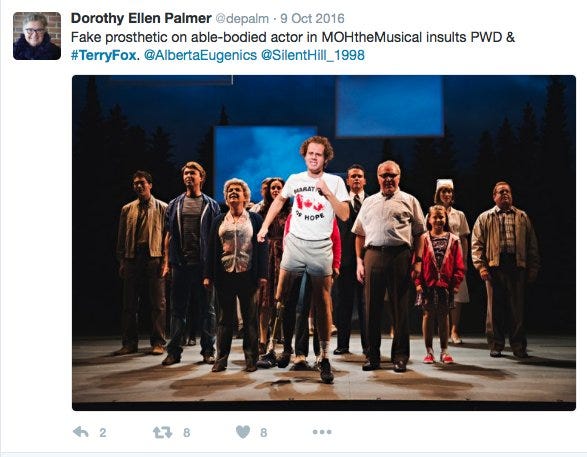


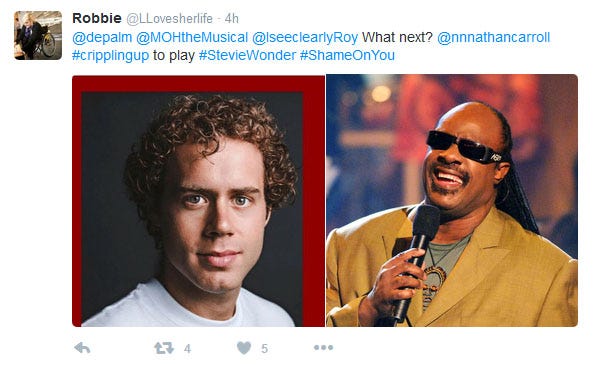
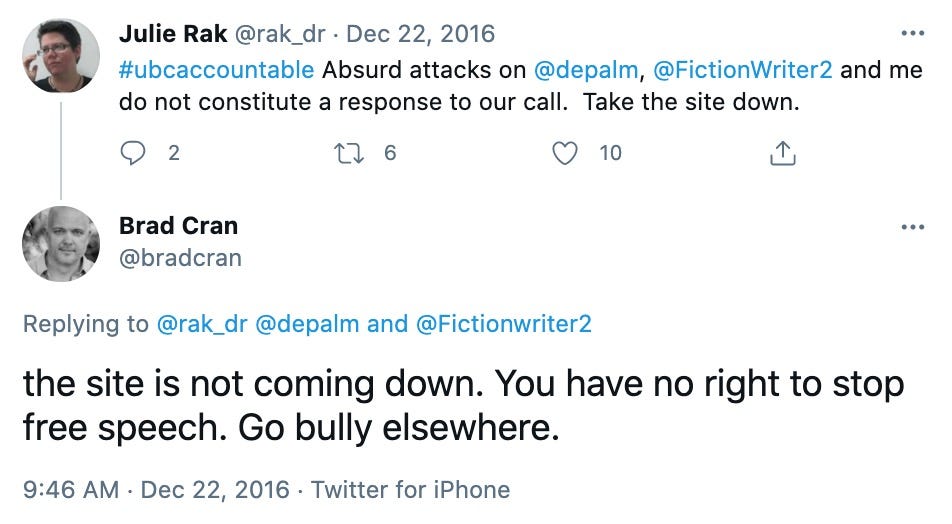
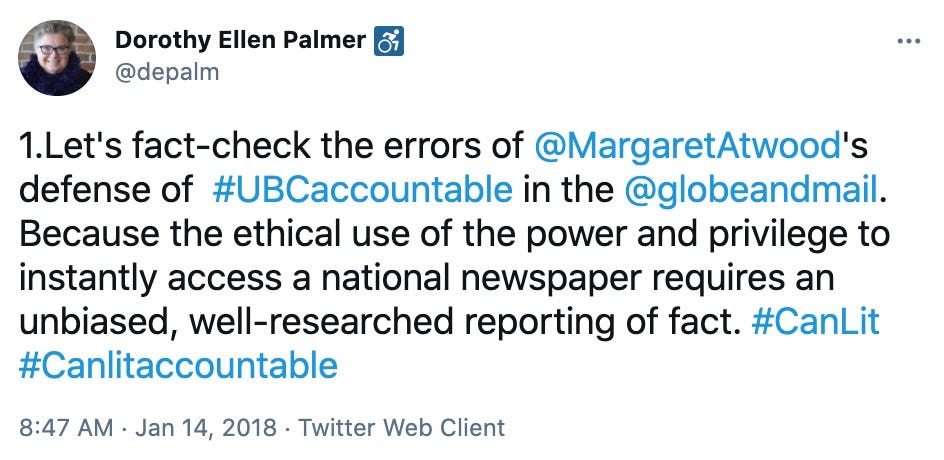
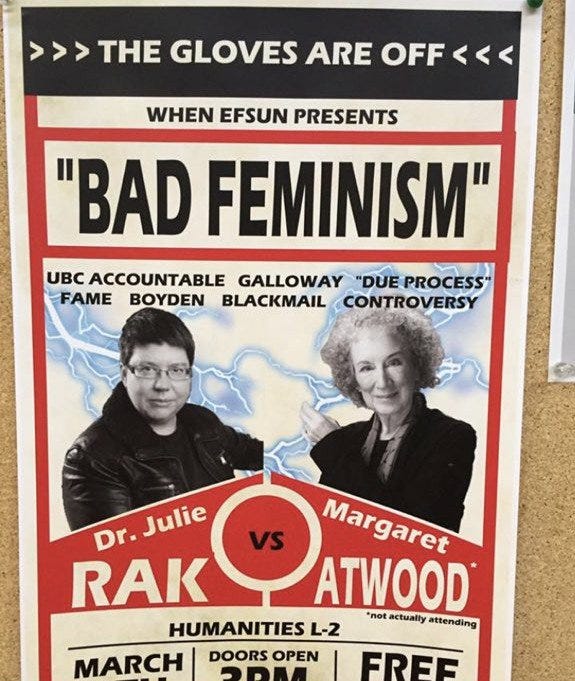

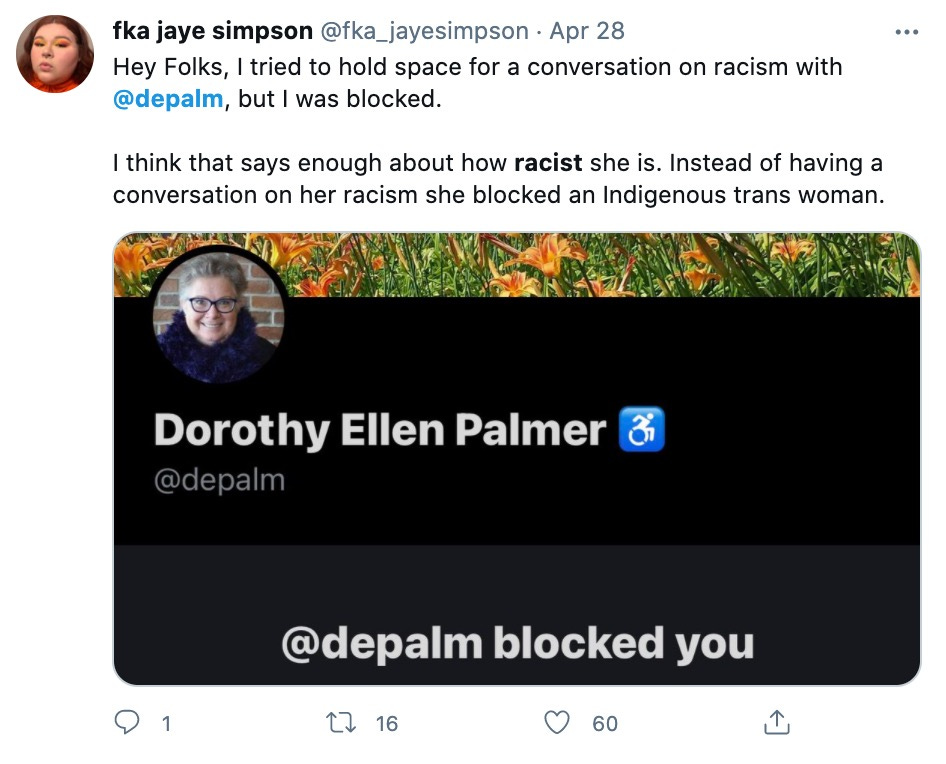
My mother and I are both really enjoying this series. You lay it out well - it's complicated stuff - many details for the uninitiated. And we aren't getting this info from any other press right now.
I hope that you will put all your research in this in a book. I also hope that somehow Steven Galloway can be encouraged to write again. He is a talented writer and a seemingly decent human being who did not deserve to be treated in this outrageous way. Canadian literature has been diminished by his absence.